Contents
Broccoli in Our Country is still much inferior in popularity to white cabbage and cauliflower, well known to gardeners for a long time. But the situation is gradually changing, and this is facilitated by the regular appearance on the market of varieties and hybrids that combine high productivity, rich chemical composition and good taste with a “trademark”, keeping quality and ease of cultivation. All these criteria are met by the Monaco F1 broccoli hybrid. It was created in the Netherlands, but quickly and successfully “take root” in regions with very different climates.
Description and characteristics of broccoli Monaco F1
Monaco F1 is a first-generation broccoli hybrid created by one of the world-famous Dutch agricultural firms, Syngenta Seeds BV. At home, it appeared on sale in 2008, at the same time an application was submitted for official registration in the Federation. All the necessary variety tests were completed in 2012, since that moment hybrid broccoli is listed in the Register of Breeding Achievements.
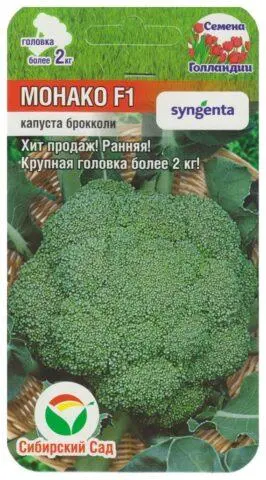
Now you can buy domestic seeds, produced under license by the agricultural company “Siberian Garden”
It is officially recommended for cultivation by amateur gardeners. The most preferred regions for its cultivation are not indicated: Broccoli Monaco F1 has adapted well both in the south and in territories with a much more severe climate (Urals, Siberia, the Far East, North-West).
Monaco F1 is a late maturing hybrid. It takes 115-125 days for the heads to mature. This is due to the feature that distinguishes it from most other varieties of broccoli. When the head is cut off, “additional” smaller ones on the lateral branches of the stem are not laid, which is logical: they probably will not have time to ripen before frost.
The rosette of leaves of broccoli Monaco F1 is powerful, but relatively compact, semi-raised. The leaves are medium-sized, color typical for cabbage. There is also a characteristic “waxy” coating, a slight “blistering” of the surface and a “waviness” of the edge.
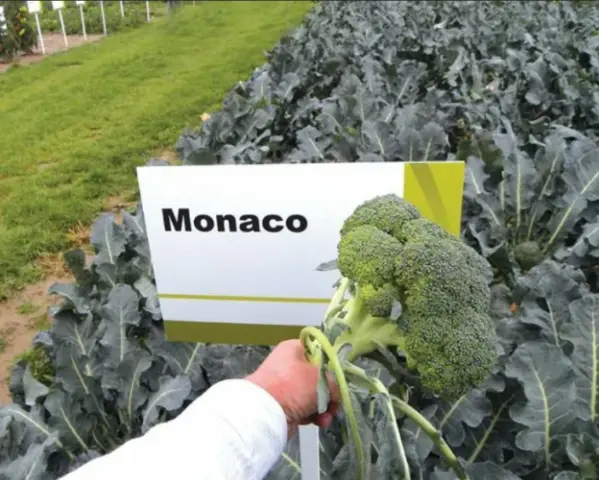
The plant reaches a height of about 50 cm, is formed into a single stem
The average weight of Monaco F1 broccoli heads is 0,6 kg. In shape, they are rounded (rarely domed), very dense, but at the same time juicy grayish-green hue. The “bumpiness” of the surface is not very pronounced. Integumentary leaves are absent.
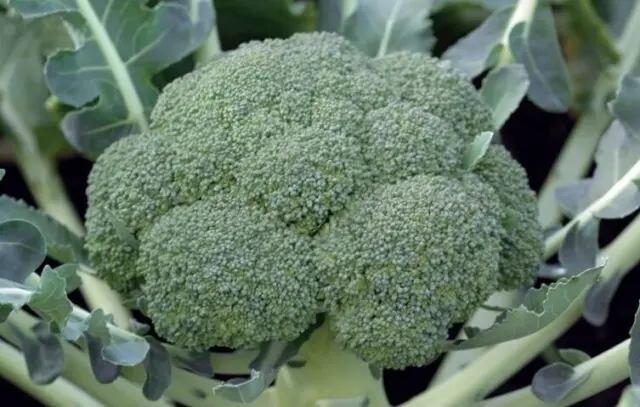
In very favorable conditions and with high-quality care, the heads can gain weight up to 1,5-2 kg
Productivity
According to the State Register, the yield of Monaco F1 broccoli is 4,2 kg/m². The originator in the varietal characteristics indicates other data – 7-8 kg / m². Such a significant “scatter” can be easily explained by differences in climatic conditions.
Advantages and disadvantages
Broccoli Monaco F1 in Our Country is not officially recognized as suitable for cultivation on an industrial scale and private farms, although it has good keeping quality and transportability. An obstacle is the real risk of yield loss when growing outdoors due to early first frosts, when the temperature drops sharply below -7 ºС.
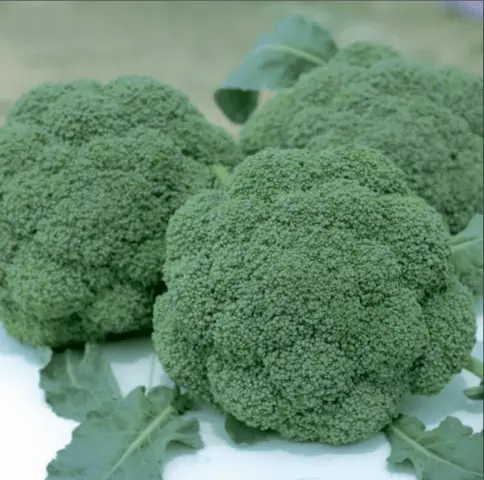
Broccoli Monaco F1 is easily “disassembled” into individual inflorescences, which is very convenient for cooking any dishes, as well as for freezing
Pros:
- the ability to adapt to different and not always favorable climatic nuances;
- endurance and “stress resistance”, good resistance to negative external influences;
- stable yield, little dependent on the weather during the season;
- undemanding in terms of care;
- high resistance to fungal and other diseases typical of the culture;
- keeping quality and transportability of heads;
- external presentability of broccoli;
- versatility of purpose, suitability for any “culinary” purposes.
Cons:
- long growing season;
- frequent cases of “attacks” typical of the culture of pests, the need to apply appropriate preventive measures.
Features of landing
Due to the long growing season, Monaco F1 broccoli is grown primarily in seedlings. The procedure is carried out according to the standard algorithm, including preplant preparation of seeds in the form of soaking in a biostimulant solution. To avoid the picking stage, it is better to immediately plant them in small peat pots or plastic cups.
When to plant seedlings
Seedlings begin to grow from the second half of March to mid-April. The specific time depends on the local climate. From the moment of emergence of seedlings to the transplantation of seedlings of seedlings into the ground, 40-45 days should pass. During this time, they develop 5-6 true leaves.

Before planting in the ground, it is desirable to harden the seedlings
Sowing in open ground
Growing Monaco F1 broccoli by sowing seeds directly into a garden bed in Our Country can only be practiced in southern regions with a subtropical climate. They are planted in mid-April, following the recommended landing pattern.
Seeds in the “holes” are sown in several pieces. When a pair of true leaves is formed on the seedlings, a “culling” is carried out, leaving one copy each. Quality seedlings are used to fill the resulting “gaps”.
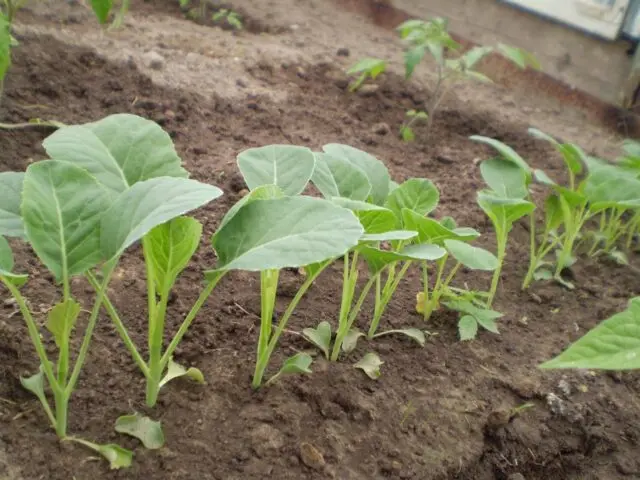
When planting seeds directly in the crop bed, you will have to wait longer for at least 15-20 days
Features of care
To get a good crop of Monaco F1 broccoli, it is enough to provide her with:
- Watering. Usually enough once a week (2-3 liters per plant). If there is no rain and the temperature rises above 25 ºС, the substrate is moistened twice as often.
- Top dressing. The first (nitrogen) is carried out 12-15 days after transplanting the seedlings to the garden or 25-30 days after the germination of seeds sown immediately in open ground. After waiting 15-20 days, then complex fertilizers containing potassium and phosphorus are applied at monthly intervals.
- Loosening and hilling. The soil in the garden with Monaco F1 broccoli is loosened to a depth of about 8 cm 2-3 times a month (ideally after each watering). Rosettes spud three weeks after transplanting to the garden and again – after 1,5 weeks.
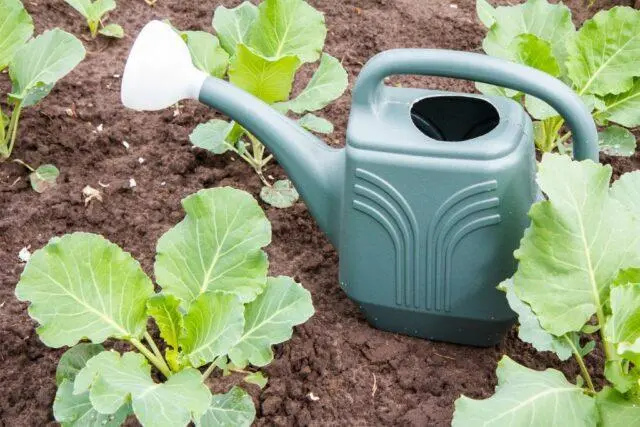
In addition to watering, Monaco F1 broccoli responds very positively to foliar spraying.
Harvesting and storage of crops
Since Monaco F1 broccoli is not prone to bushing, the entire crop can be harvested at one time. From the moment of transplantation into open ground, approximately 70-75 days pass.
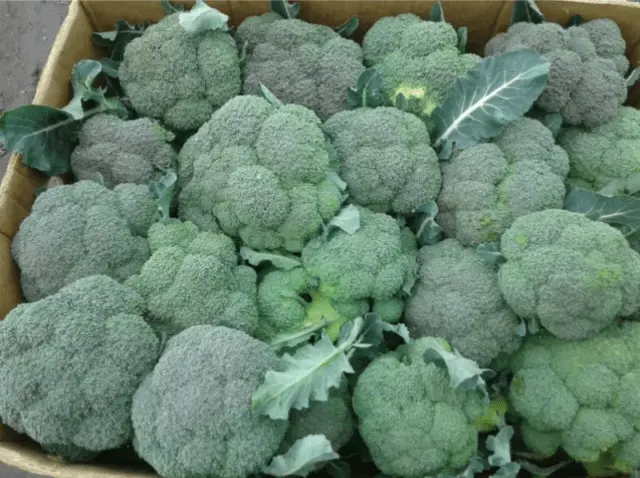
It is impossible to pull excessively with harvesting, “overripe” yellowing cabbage is no longer suitable for food
It is best to cut the heads of Monaco F1 broccoli in the morning or late at night – at this time they gain maximum juiciness. You need to choose the moment when the weather is dry for at least several days in a row so that the cabbage does not “soak” with moisture: this reduces its shelf life and makes the taste less saturated.
Monaco F1 broccoli will keep for about two weeks at room temperature. In a cellar, basement, other place with an air temperature of 2-4 ºС, humidity of 85-90% and good ventilation – up to three months. The heads are laid out in separate plastic bags, having previously made several holes in them and wrapped part of the stem with a damp cloth. The longest (about six months) stored frozen broccoli Monaco F1.
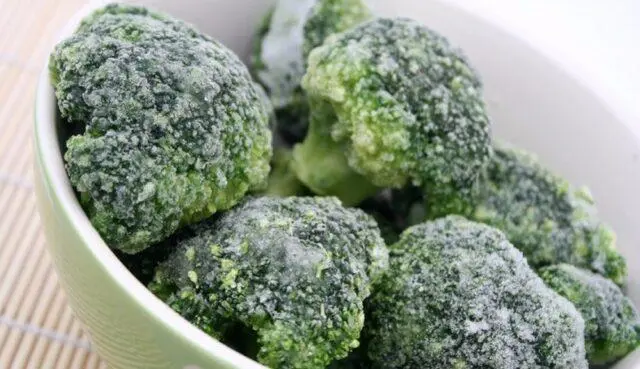
In packages and containers, broccoli is “packed” in small portions – defrosting and re-freezing are contraindicated for it
Conclusion
Broccoli Monaco F1 is by no means unique or outstanding, but it is a very worthy hybrid, a kind of “workhorse”. Gardeners appreciate it for its reliability, endurance and “stress resistance”, which allows you to count on a good harvest, even if the weather during the season is not too lucky, and there is not enough time and effort to follow all the rules for care.









